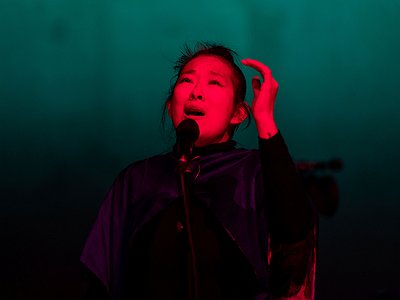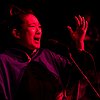Part 1
Name: Stephanie Pan
Occupation: Voice artist, composer, interdisciplinary maker, performer, curator
Current release: Stephanie Pan teams up with Ensemble Klang for The Art of Doing Nothing: a feminist manifesto, out April 26th 2024.
Recommendations: The Memory Police - Yoko Ogawa; The textile art of Lizan Freijsen
If you enjoyed this Stephanie Pan interview and would like to keep up to date with her work and music, visit her official homepage. She is also on Instagram.
[Cover art image is by Chaja Hertog]
When I listen to music, I see shapes, objects and colours. What happens in your body when you're listening? Do you listen with your eyes open or closed?
I think vibrations, blood flow, movement. Listening can be very visceral for me, I feel pressure build up in my chest, or behind my eyes, my head vibrates, the hair stands up on the back of my neck, I feel the blood travel through my body.
Then my eyes are open I think. Or sometimes I drift, and I’m floating over myself, problem-solving, daydreaming, then my eyes are closed.
Entering new worlds and escapism through music have always exerted a very strong pull on me. What do you think you are drawn to most when it comes to listening to and creating music?
Well in relation to the first question, I have always had a very visceral, primal connection to music, particularly with voice, whether it’s mine or someone else’s.
I think it’s a way for us to talk about the things we can’t or don’t dare talk about. It’s a weirdly communal yet deeply private space where I think we can open ourselves to feel and understand ourselves and others.
It’s this very primal connection that has always drawn me to music.
What were your very first steps in music like and how would you rate the gains made through experience?
I grew up very classical; I sang in choirs all through my youth, I played piano, violin. Once upon a time I thought my future was about big spectacular dresses in front of an orchestra. In that respect I would say I’ve either fallen very far off the cliff or climbed a pretty big mountain, either way I’m very happy, proud.
I think my music career is very much a mirror of my own life, and in that sense it took a while to become myself let’s say. I spent a lot of my childhood trying to cope with not fitting in, not even knowing how to start, coping with the loneliness of not belonging, trying to figure out how to fit in; and then when I eventually started to understand who I was, learning to embrace this weird thing that I am, coming into my own and sinking into this weirdness to the point that I feel perfectly normal (most of the time).
Musically and artistically this means having journeyed through a very circuitous route. From being educated in classical music to moving to the Netherlands to specialize in early music singing, hitting a wall, then finding my way (back) to contemporary new music, extended vocal techniques, improvisation, to consolidating my own personal love for things like drum n bass, hardcore tekno, indie pop, alt pop, noise, to experience in and love for theater and performance art.
Moving away from the rigidity of classical training and music, embracing the fact that I’m hyperactively curious, a jack-of-all-trades, allowing myself to be a blade of grass, letting the winds bend and twist me while remaining grounded in the discipline of a classical training has been so wonderful and rewarding.
Letting experiences shape and guide me, trusting that even when I feel lost I’m not really lost, has been the cornerstone of who I am as a person and as a maker.
According to scientific studies, we make our deepest and most incisive musical experiences between the ages of 13-16. What did music mean to you at that age and what’s changed since then?
I guess that might have been the first meaningful experiences I had as a vocalist, or understanding that I particularly had a singing voice.
I’ve been singing since as long as I can remember, but I suppose it was about that time I first became aware of really having something to say through the medium, that I was expressive as a singer, that I needed it, even. The voice is still absolutely central to my work, but so much has changed about my understanding of what voice is, and what I want to do with it.
Trying to become ‘a soprano’ was totally crippling, and that could be a question of circumstance, but ultimately I think coming to the understanding that this voice could be so much more, that I needed to create my own work, that I had a special way of approaching my own voice not only as a voice artist but as a maker was critical to having a future with it.
How would you describe your own relationship with your instrument, tools or equipment?
I think with the voice you have this special weapon for reaching people; it’s so incredibly personal and vulnerable and of the body. I think it has the potential to speak to the very soul of others, so you kind of have that extra directness. On the other hand, it’s a complete pain in the ass, because it’s always with you, it’s part of you so when you don’t feel good your voice doesn’t feel good, so you have to have a certain kind of preciousness about your own voice which can be annoying and inconvenient.
From the perspective of approach, I’m quite fascinated by how much our voices are shaped by circumstance; how what we think of as our ‘natural’ voice is actually dictated by society, culture, class, upbringing, gender roles etc. Trying to unpack that and exploring what the breadth of my voice can be, the spaces it can occupy is a way to stay in conversation with myself, to challenge my own expectations and tropes.
Alongside my voice I have a bunch of synths and drum machines and samplers and objects and instruments; those things are fun because I don’t have the same dexterity or control or skill with them as I do with my own voice, so they require me to be precise and clear and playful in a different way.
I often refer to my sound as ‘analog digital’; I feel like what I’m doing is digesting digital aesthetics and technology and spitting it back out through this very organic, imperfect apparatus. Because I’m not terribly skilled with any of it there’s a wonkiness to what I play which I really enjoy leaning into, and I love playing with this unsettled foundation that’s somehow still in control even though it sounds like it might collapse at any moment. I’ve grown up a bit with my hardware, so there’s more stability now but I definitely still look for this instability of sound when I write.
And then when I have the luxury of composing for other musicians, and incredible musicians at that, like for Ensemble Klang with The Art of Doing Nothing I really get to lean into fantasy and imagination, because I can ask for things I can absolutely not do myself but I know they’re very well equipped to do, and stretching my fantasy beyond my own limitations is intimidating, scary, fun.
I’m sure this is pretty obvious for composers but it’s been a pretty big step for me, coming from a performer/maker background to starting to own this term ‘composer’ for myself.
Where does the impulse to create something come from for you? What role do often-quoted sources of inspiration like dreams, other forms of art, personal relationships, politics etc play?
I think I’m always looking for a way to share my heart with people as kitsch and cheesy as that sounds. Loneliness is a very central theme, searching for understanding and belonging. And in order to create space for the listener to find their own experience in what I do, I like to approach these very intimate topics from a kind of philosophical detachment, to try and view myself from the outside, so it comes from personal experience, but it’s not about me.
I only really have anxiety dreams, so I don’t generally find those terribly inspiring! But other forms of art, definitely, life, definitely, personal relationships, definitely, play!, politics, hmmm. I often refer to my work as ‘proto-political’; I feel like I’m trying to look at the ways we cope with each other, understand each other, share space with each other. How can we belong to each other, how can we deal with difference, how do we cope with loneliness?
And from a political perspective, I’m very excited with my latest work The Art of Doing Nothing: a feminist manifesto that I’ve started to find a way to talk about personal politics in a more concrete way, something I’ve been wrestling with for some time, while still maintaining this poetic space.
And different art forms help you look at things with different perspectives, they reveal blind spots in other practices and vice versa. Not necessarily from a content level because I think ultimately we’re trying to address similar questions, but from a structural or formal level, what do we take for granted as music makers, how can we create more depth of experience, how can we challenge what a music experience is?
And play! I think this is such a fundamental tool for learning and understanding and revealing ideas, as well as an antidote for taking yourself too seriously.
Are you acting out parts of your personality in your music which you couldn't or wouldn't in your daily life? If so, which are these? What, would you say, are the key ideas behind your approach to music?
I feel like I’m very much myself on stage, although I was just told about someone who met me recently being very surprised by what they saw on stage!
In general I think you have the chance to be a larger, more brutal, more direct version of yourself, a place where you can be brutally honest. There’s this burden of being rational and functional in everyday life, of making sense and operating within a fairly narrow bandwidth of communication, whereas in creating art you kind of have artistic license, the expectation even, to be kind of larger than life. So you can go to these places that you can’t go to in polite society, get messy, get outraged, desperate, elated, ecstatic, it’s a kind of safe space to express all these things that exist inside of us that we’re constantly keeping at bay.
And I’m definitely grateful to have this outlet for these things, an outlet so that I can keep them close to me, keep them very near the surface so I can access them when I need or want to.






